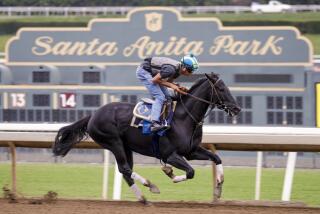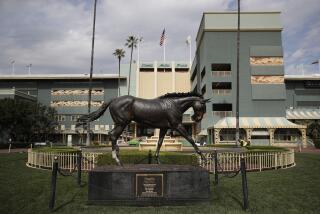Everett Won’t Accept Settlement of $150,000 a Year
- Share via
Hollywood Park’s new board of directors was told Monday that Marje Everett will not be accepting a lifetime settlement of $150,000 a year that was offered her after she resigned as the track’s chief operating officer earlier this month.
At the track’s annual shareholders’ meeting, an attorney who said she represented Everett read a letter that said: “Although this offer was well-intentioned, I have no intention of accepting it.”
When Everett, a fixture at Hollywood Park since 1972, resigned on Feb. 3, ending a proxy fight initiated by R.D. Hubbard, she was offered a package that included $150,000 a year for life, health benefits and access to the track.
Hubbard, presiding over Monday’s meeting, which was attended by an estimated 250 shareholders, responded to Everett’s letter by saying: “I hope she will reconsider these well-deserved benefits.”
Hubbard is now president, board chairman and chief executive officer of Hollywood Park. Harry Ornest was elected vice chairman.
In winning the proxy fight, Hubbard negotiated Everett’s benefits with members of the board who had supported her. At least one of Everett’s supporters had suggested a $350,000-a-year stipend.
“I did not participate in the negotiations,” Everett’s letter said. “They give the false impression to the stockholders that I will be getting some special benefits.”
Everett did not accept a salary during her long stay at the track.
The shareholders were told that a quarterly dividend of 15 cents a share will be paid near the end of March.
Hollywood Park, which has a debt of about $45 million, has experienced an expense of more than $9 million as the result of the proxy fight. The track was responsible for its own expenses and Hubbard’s as well, because he won the contest.
Ted Goldberg, a shareholder, wanted Everett’s supporters on the board--John Forsythe, Allen Paulson and Merv Griffin--to explain why they continued the proxy fight when, in Goldberg’s opinion, “it was evident as early as last October that Hubbard was going to win.”
Griffin did not attend the meeting, and Hubbard intercepted the question before Forsythe and Paulson could answer. “It was unfortunate what happened,” Hubbard said. “Once it (the proxy fight) started, it kept escalating and escalating.”
Another shareholder said: “The proxy fight was a disgrace.”
Hubbard outlined his plans for the track, which, because of suggestions from horsemen, will retain its 1 1/8-mile racing oval. Hubbard wanted to reduce the size to a mile.
Hubbard will go ahead with his plan to eliminate the double finish line. As a result, Hollywood Park may be the only track in the country that doesn’t run races at a distance of a mile. The track will run races at 7 1/2 furlongs, which is a half-furlong short of a mile.
Hubbard told the shareholders that the closing of the pavilion will save the track $1 million a year. The shareholders were also told that 30 of the track’s 337 acres may be sold to United Parcel for $18.6 million. The acreage is not considered necessary to conduct racing. Another 20 acres may be sold to the Forum, which is located across the street from the track, for $20 million, but the Hollywood Park Realty board is still not convinced that this would be the best thing to do. The 20 acres could be used for parking at both the Forum and the race track.
Besides Hubbard and Ornest, others elected to the board of the Hollywood Park Operating Co. were Kjell H. Qvale, Robert T. Manfuso, Howard W. Koch, F. Van Kasper, Richard J. Boushka, Herman Sarkowsky, Warren B. Williamson, John V. Newman, J.R. Johnson, Robert Sangster, Thomas Gamel, John Forsythe, Merv Griffin, Bruce P. McNall and Allen E. Paulson.
Williamson is chairman of the Hollywood Park Realty board. Others elected to that board were Newman, Gamel, Hubbard, Ornest, Jeffrey J. Rhodes, Vernon O. Underwood Jr. and Lynn P. Reitnouer.


